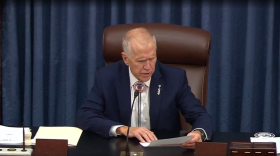North Carolina has the largest state-recognized Native American population east of the Mississippi River. But until recently, state-recognized Native nations have had little input on issues of environmental governance.
The planning of the Atlantic Coast Pipeline changed that, as state-recognized Tribal nations sought to have input in the planning and permitting of infrastructure that would have been disruptive to land and waters in Tribal territories. A new study, co-authored by Ryan Emanuel, associate professor in the department of forestry and environmental resources at North Carolina State University and enrolled member of the Lumbee Tribe of North Carolina, outlines the barriers indigenous peoples faced in seeking inclusion in the pipeline planning process. Emanuel joins host Frank Stasio to talk about the study and its results.










